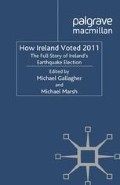Abstract
The idea of an ‘internet election’ was initially put forward in 1997.1 However, there is little evidence to date that online campaigning has supplanted more traditional campaign practices. This is particularly true of Irish campaigns, which are hardware-rich affairs characterised by substantial volumes of face-to-face human interactions. A study of the 2002 Irish campaign was entitled ‘None of that post-modern stuff around here’,2 and many ‘pre-modern’ patterns and practices endure in contemporary Irish politics. All of the coverage of the 2011 campaign attested to the ongoing centrality of the ‘canvass’ — meaning that, to be electable, Irish politicians must engage heavily in individual-level, door-to-door persuasion using a mixture of argumentation and personal charisma. No serious campaign consultant would advise his or her candidate to focus solely on online campaigning in an Irish election and an investigation of the campaign activities that corresponded to electoral gains in the 2007 Irish campaign found that posters and leaflets were the most effective campaign tools.3 In 2011, posters and leaflets remained must-have items for any serious candidate. Indeed, one of the election’s more amusing stories concerned the large number of heavy-duty posters that came loose and flapped around the country like deranged birds in the campaign’s first week.
Access this chapter
Tax calculation will be finalised at checkout
Purchases are for personal use only
Preview
Unable to display preview. Download preview PDF.
Notes
Maria Laura Sudulich and Matthew Wall, ‘Keeping up with the Murphys? Candidate cyber-campaigning in the 2007 Irish general election’, Parliamentary Affairs 62: 3 (2009), pp. 456–75;
Maria Laura Sudulich and Matthew Wall, ‘Every little helps: cyber campaigning in the 2007 Irish general election’, Journal of Information Technology & Politics 7: 4 (2010), pp. 340–55.
For a review see David Farrell and Paul Webb, ‘Political parties as campaign organizations’, pp. 102–28 in Russell J. Dalton and Martin P. Wattenberg (eds), Parties without Partisans: Political change in advanced industrial democracies (Oxford: Oxford University Press, 2000);
Pippa Norris, Developments in Party Communications (Washington, DC: National Democratic Institute for International Affairs, 2005);
Paul Webb, David Farrell and Ian Holliday (eds), Political Parties in Advanced Industrial Democracies (Oxford: Oxford University Press, 2002).
Dalton and Wattenberg, Parties without Partisans; Rachel Gibson and Andrea Rommele, ‘Measuring the professionalization of political campaigning’, Party Politics 15: 3 (2009), pp. 265–93.
Rachel Gibson and Andrea Rommele, ‘Changing campaign communications: a party-centered theory of professionalized campaigning’, International Journal of Pressi-Politics 6: 4 (2001), pp. 31–43.
Cristian Vaccari, ‘Technology is a commodity: the internet in the 2008 United States presidential election’, Journal of Information Technology & Politics 7: 4 (2010), pp. 318–39.
Paul Anderson, What is Web 2.0? Ideas, technologies and implications for education, Feb. 2007 (Bristol: JISC), http://www.jisc.ac.uk/media/documents/techwatch/tsw0701b.pdf, accessed 19 June 2007.
Wainer Lusoli and Steven Ward, ‘Logging on or switching off? The public and the internet at the 2005 general election’, pp. 13–22 in Stephen Coleman (ed), Spinning the Web: Online campaigning during the 2005 general election (London: Hansard Society, 2005).
Rachel Gibson, Marta Cantijoch and Steven Ward,‘Online citizen-campaigning in the UK general election of 2010: how did citizens use new technologies to get involved?’ Paper presented at ‘Internet, Politics, Policy 2010: An Impact Assessment’, conference organised by the Oxford Internet Institute, Oxford, September 2010.
Editor information
Editors and Affiliations
Copyright information
© 2011 Matthew Wall and Maria Laura Sudulich
About this chapter
Cite this chapter
Wall, M., Sudulich, M.L. (2011). Internet Explorers: The Online Campaign. In: Gallagher, M., Marsh, M. (eds) How Ireland Voted 2011. Palgrave Macmillan, London. https://doi.org/10.1057/9780230354005_5
Download citation
DOI: https://doi.org/10.1057/9780230354005_5
Publisher Name: Palgrave Macmillan, London
Print ISBN: 978-0-230-34882-0
Online ISBN: 978-0-230-35400-5
eBook Packages: Palgrave Political & Intern. Studies CollectionPolitical Science and International Studies (R0)

